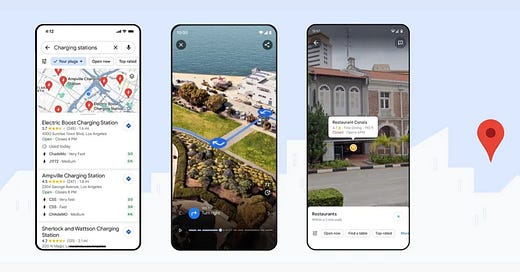Google Maps Gets Smarter with AI-Powered Upgrades
Google is taking its popular Maps app to new heights with advanced artificial intelligence. As the technology giants race to integrate cutting-edge machine learning capabilities, Google is leveraging computer vision, neural networks and other AI technologies to enhance Maps in significant ways. From realistic 3D previews of routes to automated location identification using just a camera, Google is delivering a more informative and hands-free mapping experience. Some of the major AI-powered changes include :
Immersive View Brings 3D Exploration to Route Planning
One of the standout new features is Immersive View, which Google first unveiled at its I/O developer conference earlier this year. Using the immense computing power of neural networks trained on billions of Street View and aerial images, Immersive View can now generate photorealistic 3D models of select cities worldwide. This allows users to literally see a route before driving or walking it.
The feature is gradually rolling out to major metropolitan areas including Amsterdam, Barcelona, Dublin, Florence, Las Vegas, London, Los Angeles, Miami, New York, Paris, San Francisco, San Jose, Seattle, Tokyo and Venice. Simply tap the new "Immersive View" button that appears for supported destinations to enter a tiltable, panoramic perspective of your planned journey. Preview turns, landmarks, terrain and more for a much more informed trip overview.
Google Lens Augments Real-World Understanding
Integrating its groundbreaking Lens technology directly into Maps takes AI assistance further. Users can now point their camera view to overlay useful contextual information using visual recognition alone. Tap the Lens icon in search and within seconds Maps identifies places in the camera frame. Need the nearest ATM? Train station? Restaurant recommendations? Lens surfaces it all automatically.
Laser-Focused Map Details for Seamless Navigation
Behind-the-scenes, AI helps Maps achieve photorealism through upgraded building models, city landscapes, highway lane data and dynamic speed limits. The enhanced mapping provides guidance optimized for each trip. Electric vehicle owners especially benefit from new charging station listings specifying compatibility, charge speed and when outlets were last used - reducing range anxiety.
Visual Search Brings Destinations to Life
Rounding out the AI-powered interface is visual search integration. Queries like "animal latte art" or "pumpkin patch with my dog" now surface photos alongside traditional text results. Directly see pictures of places that match rather than paragraphs describing them. The immersive experience makes local exploration much more intuitive and engaging.
With AI powering elements like improved route guidance, dynamic mapping details, and enhanced destination discovery, Google aims to make every user trip amazingly seamless and hands-free. The AI-driven transformation shows in Google's ability to understand vast amounts of imagery and instantly overlay useful insights through just a camera view.
As the race for AI leadership continues among major tech firms, Google Maps demonstrates how machine learning can augment popular services in transformative ways. Only time will tell how much further these intelligent capabilities can evolve. But for now, Google Maps has raised the bar for mobile mapping with its new immersive, informative and automated AI-powered features that bring the world to life right in users' hands.





